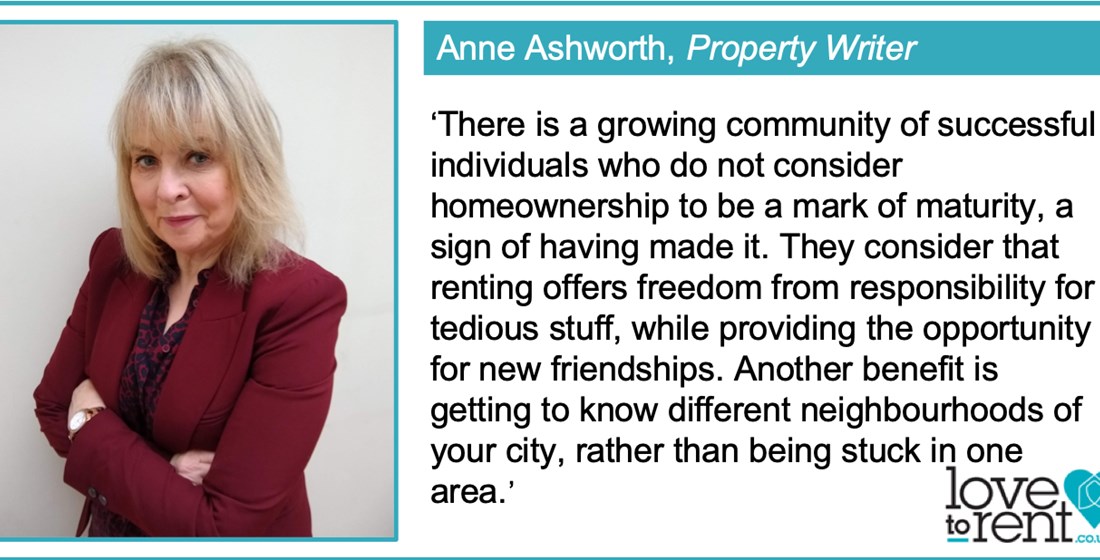Why The Government Must Boost, Not Hinder The Rental Market by Anne Ashworth
- Go back
- 13th Jan 20

Over the next few weeks, at parties, or even sometimes at the bus stop (welcome to my life) the most frequent question that I will be hearing is this: “What will house prices do in 2020?” I will have a ready-baked answer: “The forecasts vary from growth of 4% to a decline of 1%; it all depends on Brexit, really.” But I have also made a new year’s resolution to try to move the conversation on to an issue that the property-obsessed should also be talking about - the outlook for rents.
Most of us will acknowledge the truth of the lyrics of the hit song Ain’t Nothin’ Goin’on but the Rent, while knowing little about what’s actually happening to rents, which are rising, as the supply of rental homes declines with consequences for tenants and the economy. The new government has, like its predecessors, pledged to mend housing. But, if part of this strategy is to continue to penalise buy to let landlords through the tax system, which seems to be the case, there must be effective policies to ensure new sources of decent rental homes. This should be a priority for the new government. Not everyone has the means or inclination to leap onto the housing ladder, however many shiny, happy first-time buyer measures ministers can dream up.
Build to rent schemes, US-type purpose-built blocks, backed by the financial institutions that manage our retirement and other savings, could be a big part of the answer. This type of housing is already well-established in European cities, particularly in Austria and Germany and is now spreading to Asia. In China, the number of such developments is growing, with some of the funds coming from investors elsewhere.
However, not many people are yet aware that, as a result of the global shift to build to rent, the future of renting in British cities could be more Friends than Rising Damp (watch it on Amazon Prime, if you’re unfamiliar). If build to rent is properly supported by the government, as much as £75 billion could be invested in this type of housing by 2025. As I will point out to the people who quiz me on the subject of house prices, a chunk of this cash will come from their savings which means they should engage and maybe get better informed about every aspect of renting.
In England, almost a fifth of households - 4.5 million - live in the private rented sector and are remaining there for longer. Despite this, renting is still viewed as a temporary state, a staging post on the way to homeownership, although this step remains unaffordable for many. There is also an assumption that tenants are either singletons or couples without children. In fact, families make up about 22% of the private rented sector’s customer base.
These figures provide compelling evidence as to why renting will be at the centre of the debate in the months ahead. The gloomy forecasts on rising rents - which do not make easy reading for tenants and should make the government uneasy - are another reason why there will be more focus on this market in 2020. RICS, the surveyors body, is predicting an average increase of 2.5 per cent, and 3 per cent in London, as buy to let landlords quit the business.
The rationale behind the landlord tax reform was the wish to give first-time buyers a better chance of snapping up smaller properties. But although a few have seized this opportunity, others are struggling to save up deposits as higher rents eat up more of their salaries. The government appears not to have foreseen this effect which is why ministers should be grateful that build to rent developments have emerged to boost the amount of accommodation on offer. Life in a well-run build to rent block means shared social spaces to create communities and combat loneliness, superfast WiFi to work from home or watch Friends (or even Rising Damp) and, all being well, the presence of a concierge more lively than Mr Treeger, the downbeat building superintendent in Friends.
It would be unfair to accuse all private landlords of caring little for their tenants, thousands are punctilious about repairs, but being American in ethos, the build to rent sector is all about service. Many of the staff in blocks begin their careers in hotels.
Build to rent schemes are also aimed at a generation which uses technology to buy clothes and order food and wants to pick a flat in the same way. Love to Rent was set up to make choosing a place simple and to gather the information to ensure that future developments have the facilities that suit their clientele – which includes many people who prefer renting to any other lifestyle and others happy to be in comfortable surroundings, with hip décor, while they work out ways to keep their hopes of homeownership alive.
The government must devise policies that appeal to both these groups. Boris Johnson may contend that “the instincts to own your house, your own home” must be cherished. But his government should take account of changing attitudes. There is a growing community of successful individuals who do not consider homeownership to be a mark of maturity, a sign of having made it. They consider that renting offers freedom from responsibility for tedious stuff, while providing the opportunity for new friendships. Another benefit is getting to know different neighbourhoods of your city, rather than being stuck in one area. The need to retain these professionals - who are essential to the economy - means that Boris must back the innovation of build to rent. After all, as a leader, proud of his New York roots, he should be a fan.
